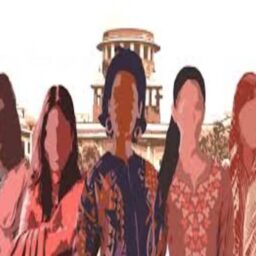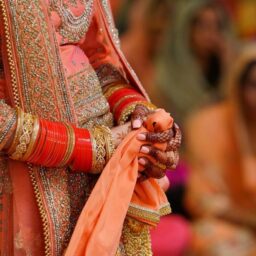INTRODUCTION
Bigamy means entering into a contract of marriage with one person even after being legally married to another. Bigamy is not a new term for us but it is being practised since time immemorial. Bigamy can be traced back from Vedas and Epics like Ramayana and Mahabharata to Hindu rulers (for example Fateh Singh of Udaipur and Mewar and Bhupinder Singh of Patiala) in modern India.
Bigamy was prevalent among Hindus Kings back then but is now an offence for Hindus (Jain, Sikhs and Buddhists) under Section 17 of the Hindu Marriage Act, 1955[1] which is particularly applicable to Hindus. However, Section 494 of the Indian Penal Code also outlawed and it reads that “Whoever, having a husband or wife living, marries again in any case in which such marriage is void because of it taking place during the life of such husband or wife shall be punished with imprisonment of either description for a term which may extend to seven years, and shall also be liable to fine”.[2]
Polygamy was outlawed for the Christians under Section 494[3] and Section 495[4] of the IPC, 1960 but a Christian sect of Mizoram known as “Lalpa Kohhran Thar” practises polygamy. The Hindu Marriage Act, 1955 made polygamy illegal for the Hindus and a polygamous marriage of a Hindu is null and void. Parsi Marriage and Divorce Act, 1936, made Bigamy a punishable offence for the Parsis in India. However, Muslim marriage law allows the practice of polygamy to the Muslims, unlike any other religions’ laws.
This provision of the Muslim law invited PILs in the Supreme Court citing Article 14 (Equality before law) and Article 44 (Uniform Civil Code) of the Indian constitution. This issue highlighted an issue of the Uniform Civil Code to implement around the country which grants an equal set of rules and laws for the entire population. Goa is the only state with a Uniform Civil Code in the country.
IS Bigamy an offence?
It is punishable under Sections 494 and 495 of the IPC. It is available and a non-cognizable offence with imprisonment which may extend upto seven years or fine or both. If a person performs second marriage fraudulently by hiding the fact of the second marriage, then the punishment will increase upto 10 years or fine or both.[5] Such offence is not compoundable under Section 495 of the Indian Penal Code. These penal provisions of Bigamy will not apply to the person who belongs to the Schedule tribe. The law of bigamy does not apply to the live-in-relationship as a legally contracted marriage without nullifying the first is essential for an offence of Bigamy.
Essentials of Section 494 of the IPC
- One should have a valid first marriage
- The first marriage should be existing
- One must have an alive spouse
- The second contract of marriage must have taken place
- Both marriages should be valid
Who can file a case of Bigamy
- Any deceived partner can file a complaint against another.
- In the case of the wife, any blood relative of hers i.e.; father, mother, brother or sister can file a complaint with the leave of the court on her behalf.
- In the case of the husband, only he is allowed to file the complaint.
Supreme Court on Bigamy
Supreme Court on the question of ‘whether a child born out of wedlock has the inheritance right of the father ancestral property?’ ruled in the case Revanasiddappa v. Mallikarjun that a child out of the second wife has the inheritance rights over his father ancestral property. In another case, Supreme Court had ruled that a child born out of a live-in-relationship is not illegitimate and in the Khushboo case, Supreme Court has virtually equated the live-in-relationship with marriage.
Supreme Court in the case Rameshchandra Daga v. Rameshwari Dagacase[6], where the question of maintenance rights in an informal and invalid marriage was raised, the Supreme Court had upheld that and had virtually encouraged the relationships out of marriage.[7]
Supreme Court in the case of Sarla Mudgal v. Union of India laid down the principles against the practice of solemnizing second marriage by conversion to Islam, with first marriage not being dissolved.[8] The verdict discusses the issue of bigamy, the conflict between the personal laws existing on matters of marriage and invokes Article 44 of the Indian Constitution. It is considered a landmark decision that highlighted the need for a uniform civil code.[9]
Recent Public Interest Litigation on Bigamy
Five women and an Uttar Pradesh based NGO Jan Udghosh Sansthan filed a petition through an Advocate Vishnu Shankar Jain in the Supreme Court of India to declare the practice of bigamy permitted under Muslim personal law unconstitutional. The petition filed by advocate Vishnu Shanker Jain said, “In India, the irony is that bigamy has been made punishable under Section 494 of IPC, subject to the applicability of personal law. The question is as to whether the State can make criminal law in such a manner which may create discrimination and same act may be punishable for someone but for others enjoyable.”[10]
The petition challenged the legality of Section 2 of the Muslim Personal Law (Shariat) Application Act, 1937[11] contending that it infringes the Fundamental Right that is Article 14 [12](Right to equality) of the Constitution as it discriminates based on gender and religion of a person and is against the basic spirit of the Constitution. The petitioner also questioned Section 494 of the Indian Penal Code as it discriminates solely based on the religion of a person which is against Articles 14 and 15(1)[13] of the Constitution of India.
Conclusion
Bigamy has been challenged from time to time on the question of different perspectives related to it. The time changes and the questions too. This time the provisions of Bigamy itself has been challenged in the court of law and so does the demand for the implementation of the Uniform Civil Code also came into play. India is a secular country and allowing polygamy specifically to the Muslim community may impact negatively. Bigamy must not be practised in a democracy and we also must be done away with Bigamy. Bigamy puts females of our country in a disadvantageous position and is infringing the fundamental right of equality of Muslim women.
Author(s) Name: Mayank Raj (Chanakya National Law University, Patna)
References:
[1] The Hindu Marriage Act 1955, s 17.
[2] S. 494, The Indian Penal Code, 1860.
[3] S. 494, The Indian Penal Code, 1860.
[4] S. 495, The Indian Penal Code, 1860.
[5] S. 495, The Indian Penal Code, 1860.
[6] MANU/SC/1057/2004.
[7] MANU/SC/1057/2004.
[8] MANU/SC/0290/1995.
[9] MANU/SC/0290/1995.
[10] Abraham Thomas,’ Petition in SC challenges bigamy under Shariat law’ (The Hindustan Times, 04 December 2021) <https://www.hindustantimes.com/india-news/petiton-in-sc-challenges-bigamy-under-shariat-law/story-jj8rGPTKxITgYQe3vj9QGM.html> assessed on 18 October 2021.
[11] Muslim Personal Law (Shariat) Application Act 1937, s 2.
[12] Constitution of India, art 14.
[13] Constitution of India, art 15(1).















